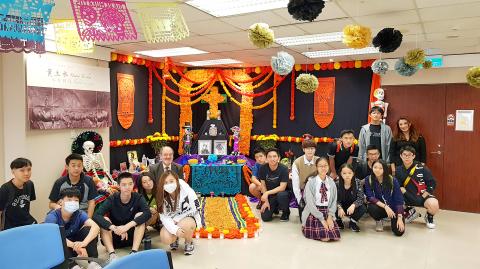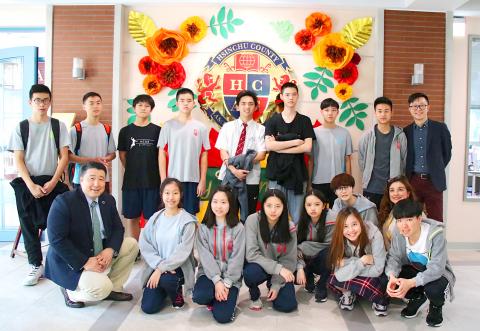Spanish is one of the most spoken languages in the world, with roughly 548 million speakers. Despite that, its popularity in Taiwan is not as high as other foreign languages — something that the Mexican Trade Services Documentation and Cultural Office is looking to change. Last year about 2,500 students pursued a Spanish major at universities, with an estimated 2,000 more taking it as a second foreign-language course.
Mexico’s trade office has conducted many activities this year to fulfill that purpose. Two young Mexican moviemakers participated in the Kuandu Festival of Cinema at the Taipei National University of the Arts. And Mexican Representative Martin Torres attended the Yilan International Arts Festival. Last month, they also brought the Mexican pianist Hernan Martinez Mercado who performed in many cities throughout Taiwan.
Torres says that there is a lot of power in culture.

Photo courtesy of the Mexican Trade Services, Documentation and Cultural Office in Taiwan
“Mexican culture, just like Taiwanese culture, is the result of thousands of years of history, and when you have two cultures that are so rich, sharing them opens the way for other venues, like business and investment” he said.
Torres added that culture is a very positive way of capturing the attention of others and getting them to know more about you, that is why he has been so focused on improving “cultural dialogue.”
Torres describes the relationship between Mexico and Taiwan as a very active one.

Photo courtesy of Principal Shon from the Hsinchu County American School
“[T]he fact that there are more than 300 Taiwanese companies based in Mexico, a constant flow of capital and of trade between the two that is only going to grow,” are very positive signs.
He added that there are many Mexican businessmen who are turning their eyes to Taiwan and that he strongly believes that this will lead to new avenues of cooperation.
Their last activity was the celebration of the “Day of the Dead,” which took place in the Taipei Economic and Cultural Office in Taipei and had the presence of Paloma Garcia, a Spanish teacher from the Hsinchu County American School, and a number of her students.
BRIGHT FUTURE
The students were optimistic about their future and told the Taipei Times that learning Spanish will positively influence their lives. Thanks to their interactions with natives of Mexico, they have experienced many of the differences between the Latin American and Asian cultures, like the way Mexican and Taiwanese people view death.
They said that for Taiwanese, death is a cause of sadness and mourning, while Mexicans think its a cause for celebration. They’ve also learned about the similarities the Asian and Latino cultures share, like strong family ties.
Garcia said that more effort needs to be made to promote the Spanish language — not only in universities, but in high Schools as well.
Taiwan can benefit from increasing its Spanish speaking population not only in the business and cultural aspects, but also by strengthening its friendship with many countries, whether diplomatic ties exist or not. With the help and support of government institutions like the Ministry of Education and Ministry of Culture, the Spanish language can get the boost it needs.

In the March 9 edition of the Taipei Times a piece by Ninon Godefroy ran with the headine “The quiet, gentle rhythm of Taiwan.” It started with the line “Taiwan is a small, humble place. There is no Eiffel Tower, no pyramids — no singular attraction that draws the world’s attention.” I laughed out loud at that. This was out of no disrespect for the author or the piece, which made some interesting analogies and good points about how both Din Tai Fung’s and Taiwan Semiconductor Manufacturing Co’s (TSMC, 台積電) meticulous attention to detail and quality are not quite up to

April 21 to April 27 Hsieh Er’s (謝娥) political fortunes were rising fast after she got out of jail and joined the Chinese Nationalist Party (KMT) in December 1945. Not only did she hold key positions in various committees, she was elected the only woman on the Taipei City Council and headed to Nanjing in 1946 as the sole Taiwanese female representative to the National Constituent Assembly. With the support of first lady Soong May-ling (宋美齡), she started the Taipei Women’s Association and Taiwan Provincial Women’s Association, where she

It is one of the more remarkable facts of Taiwan history that it was never occupied or claimed by any of the numerous kingdoms of southern China — Han or otherwise — that lay just across the water from it. None of their brilliant ministers ever discovered that Taiwan was a “core interest” of the state whose annexation was “inevitable.” As Paul Kua notes in an excellent monograph laying out how the Portuguese gave Taiwan the name “Formosa,” the first Europeans to express an interest in occupying Taiwan were the Spanish. Tonio Andrade in his seminal work, How Taiwan Became Chinese,

Mongolian influencer Anudari Daarya looks effortlessly glamorous and carefree in her social media posts — but the classically trained pianist’s road to acceptance as a transgender artist has been anything but easy. She is one of a growing number of Mongolian LGBTQ youth challenging stereotypes and fighting for acceptance through media representation in the socially conservative country. LGBTQ Mongolians often hide their identities from their employers and colleagues for fear of discrimination, with a survey by the non-profit LGBT Centre Mongolia showing that only 20 percent of people felt comfortable coming out at work. Daarya, 25, said she has faced discrimination since she